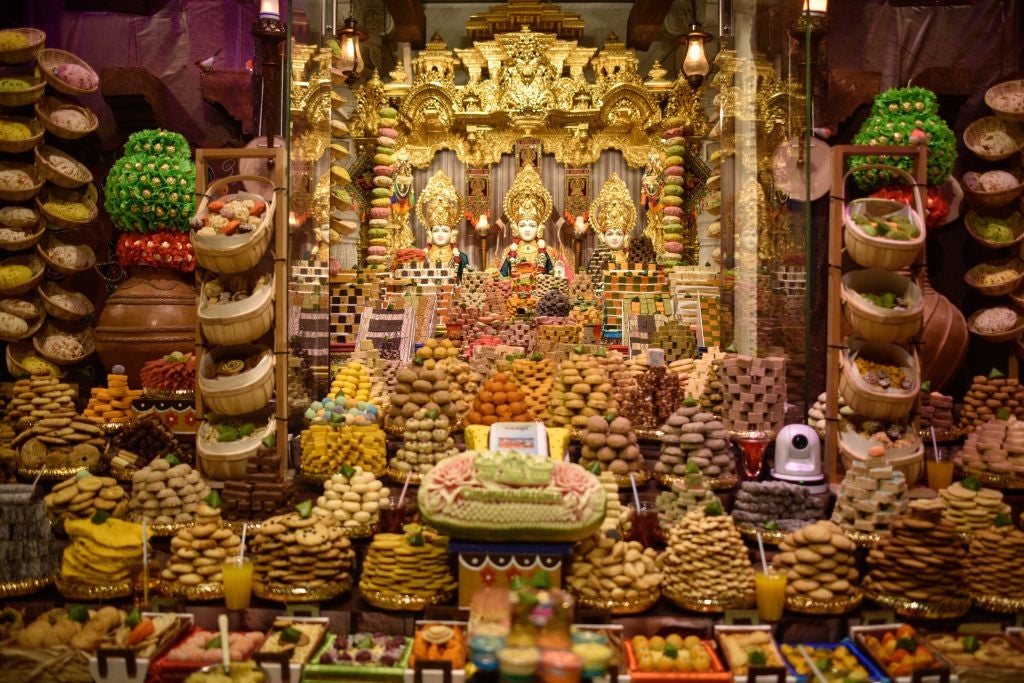British Hindus are celebrating a bittersweet Diwali in hopes for a brighter future
The lighting of the lamps symbolises the victory of good over evil, writes Jitesh Gadhia, and, this year, our collective wish to vanquish the virus


This weekend, Britain’s 1 million Hindus celebrate Diwali, the Festival of Lights, in the midst of a national lockdown.
It is an experience which none of us will forget. More so, as the social separation from family and friends, and our collective mission to defeat a deadly virus, resonates strongly with the underlying story of Diwali narrated in the Ramayana. This epic describes Lord Rama’s 14-year exile from his kingdom of Ayodhya and his defeat of the demon king Ravana. After rescuing his kidnapped wife Sita, the family returns triumphant, their path home illuminated by rows of lamps.
Even the prime minister jumped on this analogy for his own Diwali message, anticipating that we would soon vanquish the evils of the coronavirus. And those hopes started to materialise this week with positive results from vaccine trials – and thankfully much sooner than 14 years.
The allegorical comparisons aside, this festive weekend is also a moment for reflection. British Hindus have experienced a bittersweet year. The community’s successes are well trailed. The government’s race disparity audit confirms that, far from being a disadvantaged minority, British Indians rank top for economic and educational attainment. And there are now three Hindus around the Cabinet table: Rishi Sunak, Priti Patel and Alok Sharma.
However, structural health inequalities have also risen to the fore during the pandemic. The disproportionate impact of Covid on black and ethnic minority (Bame) communities has left many anxious, and even today over 20 per cent of intensive care beds are occupied by ethnic minorities.
Although Public Health England has identified various contributing factors, such as higher incidence of diabetes and heart disease amongst south Asians, the absence of a comprehensive action plan has left many disappointed. To win back confidence, the government should now prioritise the Bame community for early vaccination, alongside the elderly and other vulnerable groups, as well as frontline workers. This would give true meaning to Black Lives Matter.
The other common angst is whether the British public genuinely understands Hinduism. Although this year marks 25 years since the opening of the largest traditional temple outside India – the iconic Neasden Mandir in northwest London – our collective understanding of the world’s third-largest religion is surprisingly shallow. It is clouded by images of idol worship and mystics rather than an appreciation of a 5,000-year-old ancient civilisation from the Indus Valley.
Worse still, simplistic media portrayal conflates the politics of the Indian sub-continent with the underlying philosophy of Hinduism. For example, viewers of the BBC serialisation of Vikram’s Seth’s book, A Suitable Boy, were left with the abiding impression of an uncouth, debauched Hindu king deliberately provoking Muslim minorities, represented by a cultured and sophisticated Nawab. The lead character, a Hindu girl called Lata, was not allowed to marry her first love, a handsome Muslim boy, because of deep-seated prejudice. Hindus were shown as the majoritarian, ideological oppressors whilst others appeared as innocent victims.
The reality of Hindu philosophy could not be further removed from this warped depiction. Hinduism is the ultimate big tent. Being open to new ideas, and respect for difference, are built into Hindu thought. There is no codified belief system or prescribed set of scriptures. The recently departed former chief rabbi, Lord Jonathan Sacks, would have applauded this “dignity of difference”, as per the title of his book.
Fortunately, these misperceptions have not held Hindus back from their civic duty. Throughout the pandemic, Indian organisations across the UK have been active in community service (or sewa - one of the most admired virtues amongst Hindus, Jains and Sikhs) providing cooked meals and supplies to the elderly and vulnerable.
As highlighted in the unauthorised biography of Rishi Sunak, released this week by Lord Ashcroft, the chancellor comes from a Hindu family steeped in public service – his father serving as a GP and his mother as a community pharmacist. The disproportionate number of Indian healthcare professionals working across the NHS is no coincidence. Summing up his summer statement, Sunak said: “For me, this has never just been a question of economics, but of values: I believe in the nobility of work.” This invokes the sense of duty (dharma) which is a central tenet of the Diwali story.
British Hindus are increasingly viewed as the new electoral bellwether of middle England – socially conservative, community-orientated yet economically liberal. Even Sir Keir Starmer has recognised that the Labour Party has “much more to do to connect with the British Hindu community”. Responding to questions from schoolchildren during the online DiwaliFest last weekend, he expressed his “utter determination” to rebuild bridges.
So the lighting of lamps in our homes this Diwali feels especially poignant. As well as symbolising the victory of good over evil, it represents our collective hopes for a brighter and healthier future in every sense. One where Hindu values, rooted in tolerance rather than ideology, are better understood and where our strong sense of public duty, and passion to serve, is fully recognised.
Jitesh Gadhia has been a member of the House of Lords since 2016




Join our commenting forum
Join thought-provoking conversations, follow other Independent readers and see their replies
Comments